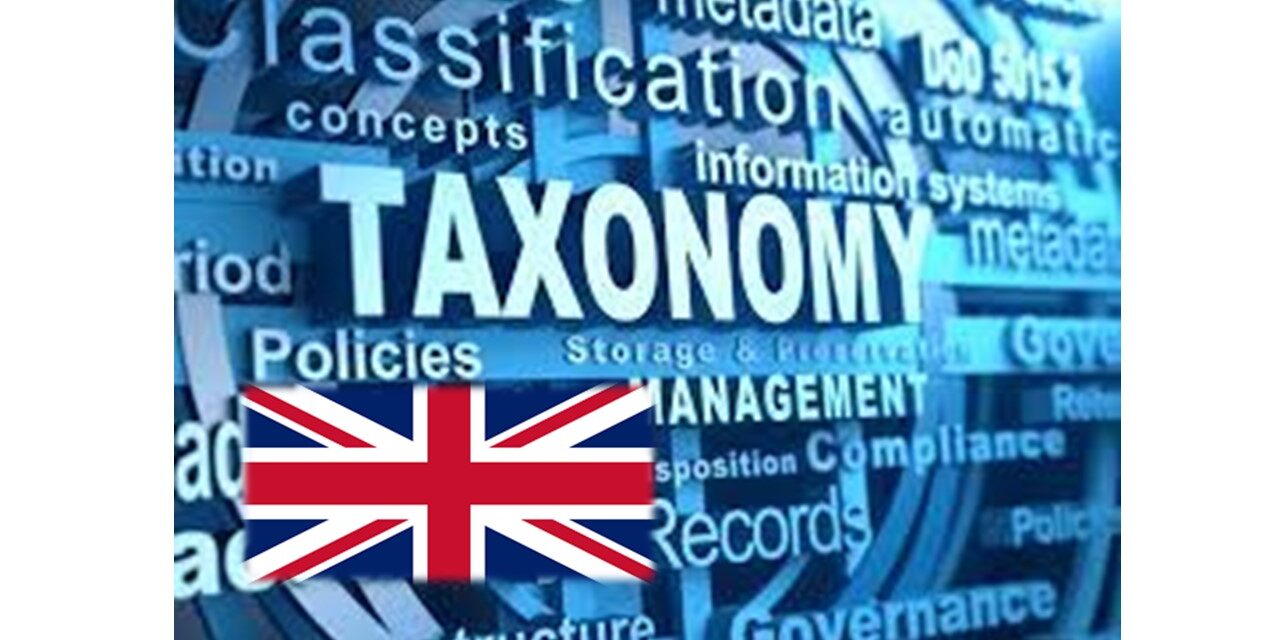Will not fulfil legal obligation to implement by end of 2022 as it flags complexities and EU taxonomy problems
Calls for the UK government to clarify its net-zero strategy intensified yesterday as it emerged the government will not fulfil its legal obligation to put the climate element of its green taxonomy into law by the end of 2022.
A statement made on 14 December by Baroness Penn, Treasury lords minister, said the government will not make secondary legislation under the taxonomy regulations this year and the  government is repealing the legal requirement to make technical screening criteria regulations by 1 January 2023. Instead, the UK will restate EU law around the taxonomy and take another year to decide the UK’s approach. The decision was taken, Penn said, after the government received advice from the Green Technical Advisory Group (GTAG) and following stakeholder engagement. “The government believes there is benefit in reviewing its approach to taxonomy development to maximise the effectiveness of our sustainable finance agenda,” she said. The government also flagged the complexities of developing a taxonomy, which is also “becoming apparent in the EU where challenges have arisen during the implementation of the EU’s taxonomy”, Penn highlighted.
government is repealing the legal requirement to make technical screening criteria regulations by 1 January 2023. Instead, the UK will restate EU law around the taxonomy and take another year to decide the UK’s approach. The decision was taken, Penn said, after the government received advice from the Green Technical Advisory Group (GTAG) and following stakeholder engagement. “The government believes there is benefit in reviewing its approach to taxonomy development to maximise the effectiveness of our sustainable finance agenda,” she said. The government also flagged the complexities of developing a taxonomy, which is also “becoming apparent in the EU where challenges have arisen during the implementation of the EU’s taxonomy”, Penn highlighted.
Responsible investment commentators are “disappointed” and said this is yet another way the UK government is distancing itself from being a leader region on climate, and further calls were issued for more clarity on how the government will reach its net-zero by 2050 target.
Despite announcing its Greening Finance Roadmap in 2021, the UK government has yet to provide a clear route to net-zero, failing to provide any further details during the chancellor’s fiscal event in September after the change in prime minister, and recently approved the first UK coal mine in 30 years.
‘Companies are seeking clarity’
 “Following a lack of clarity over the future direction of the UK’s taxonomy throughout this year, we are naturally hugely disappointed by today’s statement confirming further delays to the taxonomy’s implementation,” commented James Alexander, CEO at UK Sustainable Investment and Finance Association (UKSIF) and member of the ESG Clarity EU Committee. “The development of the UK’s taxonomy remains very important for investors and companies seeking clarity on how to align their activities with net zero, and it closely underpins other key components of the UK’s future sustainable finance regulatory framework, including the upcoming investment labels system.”
“Following a lack of clarity over the future direction of the UK’s taxonomy throughout this year, we are naturally hugely disappointed by today’s statement confirming further delays to the taxonomy’s implementation,” commented James Alexander, CEO at UK Sustainable Investment and Finance Association (UKSIF) and member of the ESG Clarity EU Committee. “The development of the UK’s taxonomy remains very important for investors and companies seeking clarity on how to align their activities with net zero, and it closely underpins other key components of the UK’s future sustainable finance regulatory framework, including the upcoming investment labels system.”
UKSIF urged the government to “restate its intention to swiftly” delivering a science-based taxonomy as well as a clear timeline for implementation, following through on the UK’s commitments made in the Greening Finance Roadmap.
“This step would help prevent the UK falling behind the EU and other jurisdictions in its leadership on sustainable finance, and we look forward to continue engaging with government and other members of the Green Technical Advisory Group in the coming months.”
 The Principles for Responsible Investment (PRI)’s head of UK policy Eliette Riera agreed defining what constitutes a green investment through a science-based taxonomy, supported by mandatory disclosures, is “critical to supporting green growth opportunities in the UK economy”. “The UK government needs to demonstrate renewed, credible and ambitious commitments to delivering on the PM’s promise to become the world’s first net-zero financial centre,” Riera said. “We will continue to work with investors and policymakers in 2023 to create a clear, enabling policy environment for responsible investors.”
The Principles for Responsible Investment (PRI)’s head of UK policy Eliette Riera agreed defining what constitutes a green investment through a science-based taxonomy, supported by mandatory disclosures, is “critical to supporting green growth opportunities in the UK economy”. “The UK government needs to demonstrate renewed, credible and ambitious commitments to delivering on the PM’s promise to become the world’s first net-zero financial centre,” Riera said. “We will continue to work with investors and policymakers in 2023 to create a clear, enabling policy environment for responsible investors.”
 Faith Ward, chair of IIGCC and member of GTAG, added: “Investors and companies are urgently seeking clarity on how to align their investments and activities with the UK’s climate goals, and the taxonomy is a vital tool for achieving this. The development of the Taxonomy is a challenging task, and one that we must get right if the UK is to achieve its ambition to become the world’s first net zero aligned financial centre. “Through our participation in the GTAG, we stand ready to continue working with government to lay the foundations for a coherent policy environment that supports the transition to net zero.”
Faith Ward, chair of IIGCC and member of GTAG, added: “Investors and companies are urgently seeking clarity on how to align their investments and activities with the UK’s climate goals, and the taxonomy is a vital tool for achieving this. The development of the Taxonomy is a challenging task, and one that we must get right if the UK is to achieve its ambition to become the world’s first net zero aligned financial centre. “Through our participation in the GTAG, we stand ready to continue working with government to lay the foundations for a coherent policy environment that supports the transition to net zero.”
A ‘usable’ taxonomy
 The team at think tank E3G pointed out the extra time provides the government with an opportunity to learn from the experiences in the EU and to ensure the UK taxonomy is “usable and has high integrity”. Kate Levick, associate director at E3G, said: “The announcement to delay the implementation of the green taxonomy is a missed opportunity to show UK leadership in preventing greenwashing, but also offers a new opportunity to learn from the experiences of other jurisdictions and create a taxonomy that is easy to use and based on science.”
The team at think tank E3G pointed out the extra time provides the government with an opportunity to learn from the experiences in the EU and to ensure the UK taxonomy is “usable and has high integrity”. Kate Levick, associate director at E3G, said: “The announcement to delay the implementation of the green taxonomy is a missed opportunity to show UK leadership in preventing greenwashing, but also offers a new opportunity to learn from the experiences of other jurisdictions and create a taxonomy that is easy to use and based on science.”
The IIGCC’s Ward agreed: “We hope that government will use this additional time to ensure the Taxonomy is well-designed and fulfils its purpose as the cornerstone of the UK’s sustainable finance framework.”
The EU taxonomy has been highly criticised by some governments and green experts for greenwashing after it was decided last year to allow two contentious energy sources, gas and nuclear, be labelled sustainable. Five civil society groups, which had members sitting with the EU Platform on Sustainable Finance, later resigned from their posts as they criticised the European Commission for “interfering politically” and “repeatedly ignoring the recommendations of its expert group”.
The UK government is currently carrying out a net-zero review, the results of which are expected early in 2023.


























